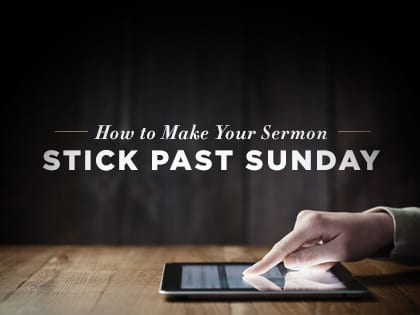Leading a church in Chicago, Illinois, is tough.
It’s even tougher during our brutal winters. So what does a pastor to do when the temperature dips below zero, and the wind chill factor dips to double digits? Cancel service? Oh no! We’re the City of Broad Shoulders, and we don’t dare cancel services due to inclement weather.
Imagine making your sermons stick past Sunday. Imagine a proven strategy to get members and guests engaging with your messages long after Sunday. Are you interested? If so, read on.
Our generation has experienced the election of the first African-American president, the 9/11 terrorist attacks, Desert Storm, the Iraq War, historic government bailouts, the passing of healthcare reform and the greatest economic downturn since the Great Depression. However, in my opinion, the greatest shifts are happening right now.
Our world is connected.
Companies like Facebook, Google and Apple have one root intention: to make it simpler for people to communicate and collaborate. Of all the tools and websites created to connect people, Facebook seems to be the most popular starting place for many.
Worldwide, there are over 1.65 billion monthly active Facebook users—which is the result of a 15 percent increase year after year. At our fingertips, we all have the tools to find, befriend and engage with people. Imagine how churches can use this platform to expand the kingdom of God.
Honestly, I do not understand why most pastors and church leaders do not leverage technology for the glory of God. Pastors, church leaders and faithful church attendees who see social networking sites like Facebook, Twitter, Instagram, Pinterest, Snapchat and LinkedIn as evil are missing a great opportunity to reach people far from God.
Early Christians used technology.
Galilee, Bethlehem and the rest of Palestine were part of a Roman world whose technological underpinnings had reached a level by Jesus’ day that would not be surpassed until the 19th century.
Those roads that the apostle Paul and his associates traveled to spread the gospel were unprecedented marvels of engineering. Without the ingeniously constructed roads that led from the streets where Jesus had walked to the cities of Syria and Greece, Christianity might have remained another obscure Judean sect like those that fill the pages in accounts by Jewish historian Josephus.
The roads were technological marvels—the original information superhighway!
What’s the point?
If Jesus, his disciples or Paul were here today, I firmly believe they’d all be using Facebook, Twitter and other social media sites to reach people for God. Considering this social trend, how can the church respond and leverage social media to help sermons stick and expand the kingdom of God?
How We Make The Message Stick at Mars Hill
At Mars Hill, we “become all things to all people that we may win some to Christ” (1 Cor. 9:22). Therefore, we decided a long time ago to use technology as a tool to help people find their way back to God.
Here’s the good news: You already have most of the tools you need to make your sermon stick while pointing people to Jesus. Here’s how you do it:
1. Pull out your smartphone, download the Facebook app and create an account.
2. Place your phone on a tripod.
3. Make sure you have a strong Wi-Fi signal (or a generous data plan).
4. Open the Facebook app and start broadcasting live.
Within seconds, you’ll see your members, their friends and people around the world engaging virtually.
With Facebook’s newest feature Facebook Live, you can start a live broadcast that automatically posts to the news feed, watch comments overlaid in real time on their stream, and then make the recording permanently available for viewing.
I’m using Facebook Live to review the previous Sunday message and live stream a video devotional. I’m calling it #Rewind.
It’s Time to #Rewind
#Rewind is a live stream (via Facebook Live and Periscope) designed for members of our church to look back on Sunday’s message and allow God’s Spirit to prompt them in areas that need to change in our lives (before we shelve the thoughts in the archives of our mind).
There are three sections to it:
1. Recall: A quick blurb about the big idea of Sunday’s message, along with links to the audio/video/transcription of the message (in case you missed it or want to go back to it).
2. Reflect: Some key questions to digest as a group, family or individual.
3. Respond: Action steps that might be helpful to pursue a healthy change in our daily lives.
Facebook Live is a great tool to keep your members engaged with your sermon beyond Sunday. You can watch #Rewind every Monday at 7 PM CST by clicking here.
© 2016, Clarence E. Stowers, Jr. All rights reserved. Originally published at www.clarencestowers.com.
Clarence Stowers is the pastor of Mars Hill Bible Church in Chicago, Illiniois. He has been in full-time ministry for 20 years.

